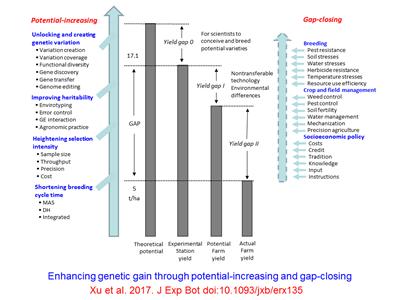Enhancing genetic gain in the era of molecular breeding
作 者:Yunbi Xu Ping Li Cheng Zou Yanli Lu Chuanxiao Xie Xuecai Zhang Boddupalli M. Prasanna Michael S. Olsen
影响因子: 5.677
刊物名称: Journal of Experimental Botany
出版年份: 2017
卷: 期:10 May 2017 页码:
doi:org/10.1093/jxb/erx135
文章摘要 :
As one of the important concepts in conventional quantitative genetics and breeding, genetic gain can be defined as the amount of increase in performance that is achieved annually through artificial selection. To develop pro ducts that meet the increasing demand of mankind, especially for food and feed, in addition to various industrial uses, breeders are challenged to enhance the potential of genetic gain continuously, at ever higher rates, while they close the gaps that remain between the yield potential in breeders’ demonstration trials and the actual yield in farmers’ fields. Factors affecting genetic gain include genetic variation available in breeding materials, heritability for traits of interest, selection intensity, and the time required to complete a breeding cycle. Genetic gain can be improved through enhancing the potential and closing the gaps, which has been evolving and complemented with modern breeding techniques and platforms, mainly driven by molecular and genomic tools, combined with improved agronomic practice. Several key strategies are reviewed in this article. Favorable genetic variation can be unlocked and created through molecular and genomic approaches including mutation, gene mapping and discovery, and transgene and genome editing. Estimation of heritability can be improved by refining field experiments through well-controlled and precisely assayed environmental factors or envirotyping, particularly for understanding and controlling spatial heterogeneity at the field level. Selection intensity can be significantly heightened through improvements in the scale and precision of genotyping and phenotyping. The breeding cycle time can be shortened by accelerating breeding procedures through integrated breeding approaches such as marker-assisted selection and doubled haploid development. All the strategies can be integrated with other widely used conventional approaches in breeding programs to enhance genetic gain. More transdisciplinary approaches, team breeding, will be required to address the challenge of maintaining a plentiful and safe food supply for future generations. New opportunities for enhancing genetic gain, a high efficiency breeding pipeline, and broad-sense genetic gain are also discussed prospectively.
下载链接:academic.oup.com/jxb/article-lookup/doi/10.1093/jxb/erx135





